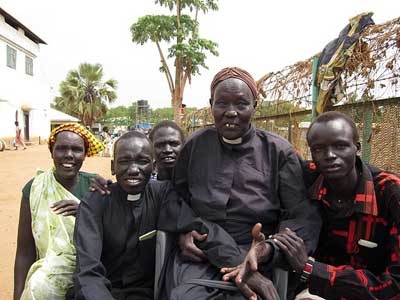
“We have no one to care for us but God,” said Rebecca Lueth, 62, a pastor who traveled by road to Juba, the capital of southern Sudan, from the town of Bor, in the South’s Jonglei state, to attend a two-week long fasting and prayer meeting organized at the Emmanuel Jieng parish in the Juba diocese of the Episcopal Church of Sudan. A pastor at Emmanuel Jieng said that more than 600 people had traveled from all over southern Sudan, and from neighboring Kenya and Uganda, to participate in this meeting focused on encouraging the people of Sudan to pray and work for peaceful elections next month.
“I am fearing for elections because the situation we are in now is not that good, we are still having problem,” Ms. Lueth explained in her native Dinka language.

